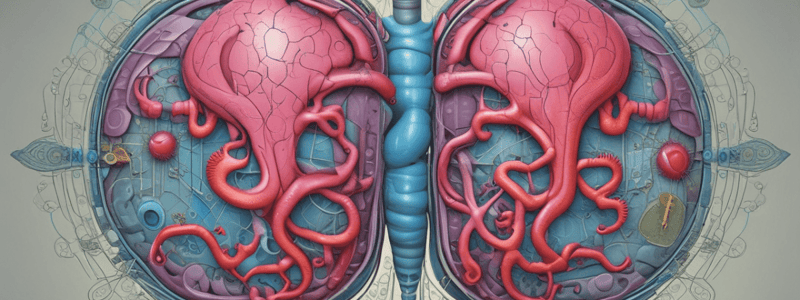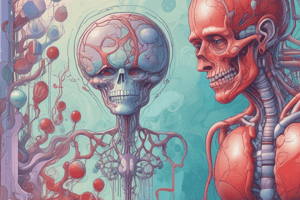Podcast
Questions and Answers
What is the primary cause of hyperacute rejection?
What is the primary cause of hyperacute rejection?
- Acute cellular rejection
- Chronic cellular reaction
- Preformed antidonor antibodies (correct)
- Slow monocyte/macrophages infiltration
Which type of graft rejection is characterized by an abrupt onset of oliguria?
Which type of graft rejection is characterized by an abrupt onset of oliguria?
- Hyperacute rejection (correct)
- Acute graft rejection
- Chronic rejection
- Secondary immunodeficiency
What is the primary mechanism of acute graft rejection?
What is the primary mechanism of acute graft rejection?
- Acute cellular rejection (correct)
- Slow monocyte/macrophages infiltration
- Chronic cellular reaction
- Acute humoral rejection
What is the primary cause of chronic rejection?
What is the primary cause of chronic rejection?
What is the primary mechanism of prevention of rejection?
What is the primary mechanism of prevention of rejection?
What is the primary difference between primary and secondary immunodeficiency?
What is the primary difference between primary and secondary immunodeficiency?
What is the primary role of CD8+ CTLs in graft rejection?
What is the primary role of CD8+ CTLs in graft rejection?
What type of graft is transplanted between two genetically identical individuals?
What type of graft is transplanted between two genetically identical individuals?
What is the primary mechanism of humoral rejection?
What is the primary mechanism of humoral rejection?
What determines the rejection time of a graft?
What determines the rejection time of a graft?
What is the primary role of MHC class I and II molecules in graft rejection?
What is the primary role of MHC class I and II molecules in graft rejection?
What is the term for the unresponsiveness to antigens?
What is the term for the unresponsiveness to antigens?
What is the result of the failure of mechanisms to inactivate or eliminate self-reactive cells?
What is the result of the failure of mechanisms to inactivate or eliminate self-reactive cells?
What type of tolerance occurs in the generative lymphoid organs?
What type of tolerance occurs in the generative lymphoid organs?
What type of tolerance occurs in the peripheral tissues?
What type of tolerance occurs in the peripheral tissues?
What is the term for the immune response against self antigens?
What is the term for the immune response against self antigens?
What are some factors that influence autoimmune diseases?
What are some factors that influence autoimmune diseases?
Flashcards are hidden until you start studying
Study Notes
Types of Rejection
- Hyperacute rejection: occurs immediately within minutes to hours, caused by preformed antidonor antibodies (anti ABO blood group antibodies, anti HLA antibodies)
- Acute rejection: occurs within days, weeks, or months, caused by acute cellular rejection and acute humoral rejection
- Chronic rejection: occurs within months to years, cause unclear, involves antibodies, immune complexes, and slow cellular reaction
Characteristics of Rejection
- Hyperacute rejection: abrupt onset of oliguria, may be associated with fever and graft tenderness
- Acute rejection: clinical presentation varies
- Chronic rejection: pathogenesis involves T cells inducing monocyte/macrophage infiltration into the graft, along with endothelial cells to produce growth factors and cytokines (PDGF, Insulin-like growth factor, epidermal growth factor, IL-1, IL-6, TNF, and TGFβ)
Prevention of Rejection
- Screening of recipient and donor for blood group matches
- Tissue matching: donor and recipient share the same MHC class I and class II antigens
- Immunosuppressive therapy
Immunodeficiency Diseases
- Primary immunodeficiency: congenital and hereditary, patient born with a genetic mutation that results in a defect in either the innate or adaptive immune response
- Secondary immunodeficiency: acquired on a transient or permanent basis, examples include SLE (which affects women about 10 times more frequently than men) and injury
Graft Rejection
- Histocompatibility antigens determine rejection between two genetically different individuals
- Major histocompatibility complex (MHC class I and II molecules) cause strong, rapid responses, principally responsible for transplant rejection
- Types of graft: xenograft, allograft, isograft, and autograft
- Mechanism of graft rejection: cellular rejection (T cell mediated) and humoral rejection (antibody mediated)
Tolerance and Autoimmune Disease
- Immune system reacts to an enormous variety of microbes but does not react against individual's own (self) antigens
- Unresponsiveness to antigens is called immunological tolerance
- Inability to respond to antigen stimulation or immunological unresponsiveness is tolerance
- Failure of tolerance mechanisms leads to autoimmunity or autoimmune disease
- Tolerance: central tolerance (inactivation or destruction of lymphocytes during early development) and peripheral tolerance (inactivation or destruction of mature lymphocytes in peripheral tissues)
- Autoimmune disease: immune response against self-antigens as a result of breakdown of tolerance, can be either systemic or organ-specific
- Factors influencing autoimmune diseases: genetic (MHC alleles, non-MHC genes, FcgR, Fas/FasL), environmental (microbes), and gender (hormones play a role)
Studying That Suits You
Use AI to generate personalized quizzes and flashcards to suit your learning preferences.




